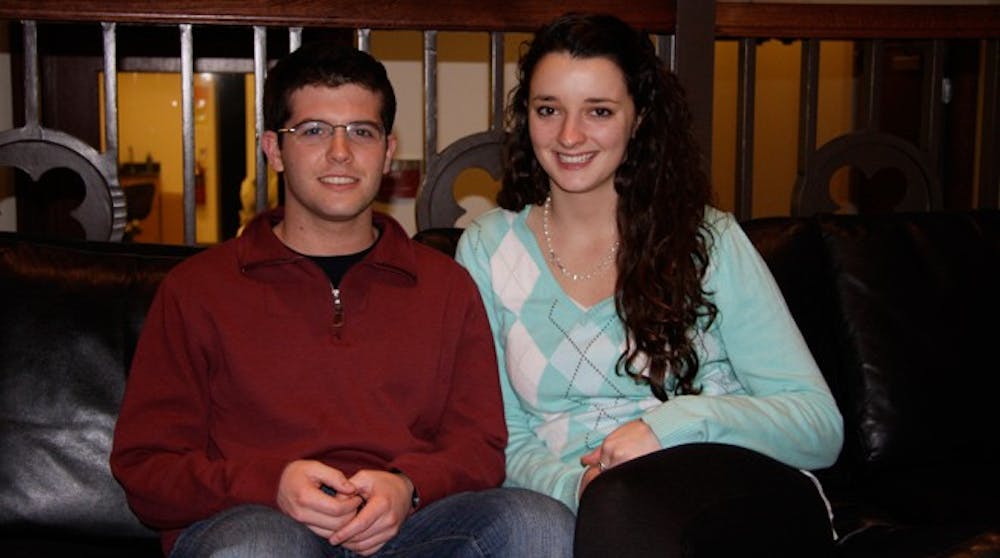Two University of Richmond students are preparing to dispatch to Haiti on a relief mission from Feb. 19 to Feb. 22, as a part of a 120 volunteers devoted to humanitarian aid.
Their mission will be to set up a tent in which orphans discharged from hospitals can receive shelter, support and access to post-operative and rehabilitative care when they have nowhere else to go.
"Anyone that has seen any photos of the destruction knows that we will come face to face with horrible tragedy," said junior Eric Rudofker, one of the students going on the trip. "There is truly nothing to prepare us for the things we are going to see."
Rudofker and freshman Alex Carrier will travel with the Relieving and Embracing Lives Interrupted by Earth's Forces foundation, established by Rudofker's family friend and neighbor, Peter Groverman, in conjunction with Project H.O.M.E., the University of Miami and the American Red Cross. Currently, R.E.L.I.E.F. has raised more than $29,000 through fundraising and donations for the trip.
Groverman chartered a Boeing 737 from Miami to Port-au-Prince that could hold a cargo of 120 people, supplies and the equipment needed to assemble several fortified tents to provide aid to an orphanage that was destroyed.
"The group is as diverse as it could be," Rudofker said. "There is a team of doctors, nurses, psychologists, accountants, contractors, electricians, professional athletes, a personal security team consisting of off-duty police officers and FBI agents, a documentary film crew, CNN photojournalists and students like us."
Most of Rudofker's and Carrier's time will be devoted to setting up the tents for the orphans with nowhere else to go, Rudofker said. There is currently no permanent construction allowed because of the fear of aftershocks.
"They get their treatment, but where do these kids go after that?" Rudofker asked. "Some come from orphanages or homes where their parents have been killed or lost. Some have no way to get back to the village they came from."
Neither student has done anything like this before, but both had planned to apply to medical school upon graduation, he said.
While discussing formalities, Carrier's dad asked her something that caught her off-guard.
"Have you thought at all about how you are going to handle this?" he asked.
Carrier affirmed that of course she had.
Enjoy what you're reading?
Signup for our newsletter
"What you have to remember is that you can't save the world," her dad said. "You will see horrible things that you cannot fix, but what you are doing is a great thing - never doubt that."
Carrier acknowledged that the trip would be difficult.
"When we get back, it's going to be hard to understand the importance of superficial stressors that presently control our lives," she said. "I knew that I would experience a sort of helplessness in this process, but I had never really thought about how life-changing this trip would be."
Although they will be in Haiti for only four days, both students expressed that it would have a lasting impact.
"I've got to get back and be psychologically recovered enough to take a midterm the next day," Rudofker said.
Rudofker and Carrier are also raising money to buy first-aid supplies for both immediate and long-term use in the shelter and its surrounding hospitals. But they have to pay for their personal expenses first, which has proven to be difficult.
For the plane, hospitality and security, Project H.O.M.E. asked each participant to raise $50, Carrier said. Rudofker and Carrier were also responsible for finding their own transportation to Miami, so they booked a flight for more than $300 per ticket.
"There is a desperate need for simple humanitarian items," Rudofker said. "Food, water, bedding, diapers and, most importantly, medical supplies: canes, crutches, walkers, any splinting materials."
Rudofker and Carrier stressed that they were trying to put a system in place that would last beyond their four days there, but they had hoped for a better response from University of Richmond students.
"We cannot do great things without the help of others," Carrier said.
Some students have had a lackluster response, Rudofker said.
"We don't think students truly understand the severity of the current situation there," he said. "The fact that 200,000 people have died from mostly crushing injuries should be enough to motivate students to help."
Carrier also mentioned students' responses to her mission.
"They often respond by saying, 'Wow, that's incredible. You are amazing people,'" Carrier said. "What they fail to notice is that the mere fact that we are going into this environment does not in itself make us amazing. Anyone who is willing to not only acknowledge the need for help, but to actively do something about it, is amazing."
Whether that means getting on a plane to Haiti or donating $5 that might have otherwise been spent on a latte, anything helps, Carrier said.
Patients are receiving Motrin for amputations, Rudofker explained.
"If students realized that donating just $5 could be the difference between someone getting an IV with pain medication and getting Advil, they would probably be more willing to donate," he said.
Carrier stressed that $5 from every student would be immense.
"Five dollars is us handing food to a child who has nowhere to go," Rudofker said.
Rudofker and Carrier set up an account to receive text-message donations from students. They still hope to raise at least $1,500 for personal expenses and supplies.
Contact staff writer Elizabeth Hardy at elizabeth.hardy@richmond.edu.
Support independent student media
You can make a tax-deductible donation by clicking the button below, which takes you to our secure PayPal account. The page is set up to receive contributions in whatever amount you designate. We look forward to using the money we raise to further our mission of providing honest and accurate information to students, faculty, staff, alumni and others in the general public.
Donate Now



